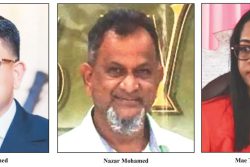Dear Editor,
A few weeks ago, the ruling PPP removed Marxism-Leninism form its party Constitution on the reason that those are concepts for another place and another time, and no longer relevant to today’s context. That was seen as the right thing to do, and was long overdue they said. As a Civil Society Advocate, similarly, I have been calling for Guyana to shatter the current colonial paradigm which undergirds our education system, and also reform the way other Government Ministries operate. Our education system is based on and driven by the NGSA (National Grade Six Examination) which used to be called the “Common Entrance.” This old, outdated, irrelevant system should be uprooted, shattered, and abandoned now. Other Caricom countries also locked in this colonial model should do something urgently.
The NGSA is essentially a “sorting” test to find the “academically gifted” who are then assigned to 6 “Top Schools” – 5 in Georgetown and one in Golden Grove. Worse, NGSA sorts all students from highest to lowest scores. Once students are slotted into the top schools, the rest are slotted into high schools of various quality rankings. Students of a similar range of scores get allotted to the same school. This is called “homogenous” grouping because all the students are close in their achievement level. In education “homogeneous groupings” are frowned upon as it is not a “best practice” and promotes inequities. The NGSA is the old colonial relic used to sift out the majority of students from attending the top schools. The top two hundred+ students are celebrated and honoured. Their photos appear on banners and newspapers, while their 15,000+ colleagues lick their wounds for not being smart enough to get QC, Bishops’ and the other top schools. On test days, there is cheerleading, holding up of motivational posters, students get breakfast during sixth grade, newspaper photos show students praying on test day, and the message couldn’t be clearer that the NGSA is a high stakes “do-or-die” test that requires “drill and kill.”
The rich class of folks like this “elite” system that separates the sheep from the goats. The non-rich folks also like this outmoded system because they hope their child will be one of the “lucky” ones to get into the top schools. They think it somehow gives you some “status” and bragging rights among your friends. Those NGSA teachers who make a side hustle doing extra lessons for pay might object to ending the NGSA. If we try to dismantle the NGSA and replace it with a system more suitable, more equitable, that will give more “parity” as our President likes to say, the upper crust rich folks would fight against it. As one Minister had remarked, QC people run things in Guyana. The poorer classes may fight against ending the NGSA too because they don’t understand that an education system based on a “Common Entrance” exam, is an idea for another place, another time, and is a malpractice in the 21st century. Why has Guyana and other Caricom countries not done more to replace the British colonial model?
The NGSA is a single measure of a student’s ability and should not carry the high stakes we place on it now. We must rebuild the education system considering Gardner’s Theory of Multiple Intelligences, Learning Styles theory, Student Interest Inventories, individual teacher and principal accountability for student achievement and school outcomes, etc. While we are at it, abolish the current colonial system of Principals being appointed simply because they have more years of employment and that such “seniority” entitles them to be a Principal whether they have the aptitude or competency for it or not. Develop a new education culture that ratchets up teacher accountability, teacher quality, and that places an emphasis on ongoing reform in curriculum, instruction, assessments, and school leadership. Already the Government is investing more in education and more new schools are being built. Reforms must happen at the building level to drive these changes, and we must see dramatic changes in student achievement. Everyone must support all attempts at reform. Our best years in education are ahead of us.
Sincerely,
Dr. Jerry Jailall
Civil Society Advocate






